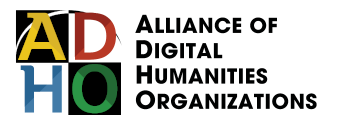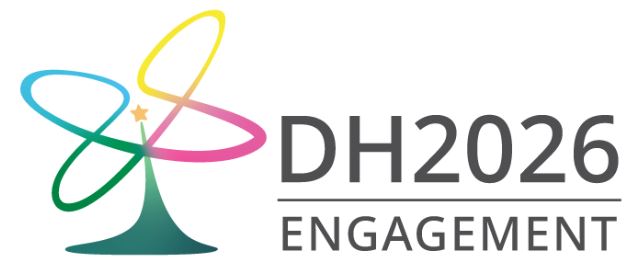Conference Theme: “Engagement”
Our theme, “Engagement,” highlights our commitment to fostering meaningful connections—both among diverse communities and between humans and emerging technologies. It emphasizes vibrancy in community interactions and critical reflection on technologies such as “Artificial Intelligence” and their responsible applications. The increasing prominence of generative AI technologies—including large language models, multimodal systems, and computer vision models—invites fresh perspectives and re-examinations of practices across the digital humanities, from data analysis and modeling to heritage studies and beyond. This conference embraces both established areas of digital humanities and emerging approaches, encouraging discussions that critically and practically examine these technological developments and consider their impacts within the communities and contexts they shape.
The three sub-themes outlined below are intended as illustrative examples to guide proposals, rather than as strict limitations on the scope of contributions.
Translating | Translinguality in the Era of AI
Machine translation using AI is becoming more sophisticated than ever. These developments not only accelerate translation and cultural exchange across languages—often without passing through English—but also expand the contact zone between humans and machines. Alongside this, the increasing integration of multilingualism into AI systems reflects a broader shift toward accommodating linguistic diversity across platforms, interfaces, and modes of communication. Meanwhile, research on cultural translation has evolved—from emphasizing fidelity and textual originality to focusing on the situatedness of translation and the politics of language hierarchies. How, then, might AI-driven translation technologies reshape the implications of “translingual practice”? And as a testbed, what possibilities and challenges does the use of AI translation in international scholarly events like DH2026 present?
Annotating | Beyond Patterns: Interpretation with Small Data
The Digital humanities have primarily explored the patterns of change in humanities using big data. However, must this data necessarily be “big”? Should the results of such analysis always reveal patterns? How should we address algorithmic bias and discrimination inherent in data collection and analysis? If we acknowledge that data itself constitutes historical and social artifacts, we may become more consciously aware of the process of producing research. Small-scale datasets can support more nuanced interpretation, and such perspectives can also inform AI model training, particularly in shaping practices for under-resourced languages or specialized domains. How can we generate high-quality data on a smaller scale, and how can we use such data to conduct research that remains open to interpretation? Could this understanding of data influence the way AI models are trained and structured?
Remembering | Digital Humanities and the Memory of the World
UNESCO’s Memory of the World register aims not only to preserve, but also to advance interest in and understanding of precious archival documents of historical and cultural value to humanity. These documents are not mere artifacts locked away in a secluded archive, but are source materials which continue to serve as primary texts for humanities research today. This sub-theme invites reflection on questions of ownership, curation, and purpose, including considerations of Indigenous Data Sovereignty: whose memories are preserved, and for whose benefit? It also encourages critical engagement with emerging digital tools, including large-scale AI systems describable as “memory machines,” examining how such technologies interact with and reinterpret these cultural memories. By highlighting contributions from diverse countries and exploring innovative methodologies rooted in digital humanities, this sub-theme seeks to enhance interpretation, access, and engagement with these invaluable resources.
Call for Submissions
We welcome submissions on a broad range of topics within the field of digital humanities, extending beyond the themes outlined above.
Languages
Proposals are requested to be submitted in English to ensure adequate peer review. Authors will be asked to indicate their preferred presentation language at the time of submission. While accommodating multiple languages in a hybrid international conference presents challenges, the Local Organizers and Program Committee will make every effort to respect these preferences and organize the conference accordingly. In line with the conference theme of “Engagement,” KADH plans to introduce an AI-powered translator during conference presentations to support both linguistic inclusivity and engagement with technological challenges. Presenters who prefer not to have their presentations AI-translated will have the option to opt out, and will give their presentation in English.
Technical Track
Authors may designate their submission as part of the Technical Track. Submissions in this track, in line with the mission of the DHTech SIG, emphasize the development, sustainability, and reuse of software and infrastructures for the digital humanities. These proposals will be reviewed by members of the DHTech SIG.
This process is being formalized for DH2026 in consultation with the DHTech SIG, and submissions following this designation will benefit from the SIG’s expertise in evaluating technical work.
Conference Formats
Proposals may be submitted for the following formats:
- Long papers (Abstracts should be 1250-1500 words): Suited for substantial, completed, and previously unpublished research; reports on developing significant new methodologies or digital resources; and/or rigorous theoretical, speculative, or critical discussions. Presentations are typically 20 minutes.
- Short papers (Abstracts should be 750-1000 words): Appropriate for reporting on experiments, work in progress, and newly conceived tools or software in early stages of development. Presentations are typically 10 minutes.
- Posters (Abstracts should be 500-750 words): For presenting work on any relevant topic, or offering demonstrations of projects, tools, artwork, creative visualizations, and software in various stages of development.
- Pre-conference Workshops or Mini-conferences: See Below
- Note that ADHO no longer accepts panel proposals.
Pre-conference Formats
- Workshops are intensive introductions to specific techniques, software packages, or theoretical approaches. Workshops last half a day and can be held in person or online. Proposals should include an agenda (focusing on learning outcomes, target audience, and instructor expertise). The abstract should be 1000 words.
- Mini-conferences are day-long gatherings that do not fit the workshop format. For example, a mini-conference could be a THATCamp, hackathon, maker faire, or a series of events at a local venue. The abstract should be 1000 words.
Special Interest Group Proposals
There are currently ten recognized ADHO special interest groups (SIG). Each SIG may organize one guaranteed pre-conference activity, either as a half-day workshop or as a half-day mini-conference. These program elements are guaranteed acceptance. SIGs must notify the program committee that they intend to organize a workshop or mini-conference prior to the conference submission deadline. We ask the SIGs to contact the program committee via kadh2026+pc@gmail.com.
Note on Review Expectations
As an interdisciplinary and international conference, scholars come to DH from a wide range of disciplinary and cultural contexts. As a result, it is not uncommon for there to be some degree of confusion regarding the expectations for submissions. Proposals for the DH conference are expected to be “abstracts” of the presentation to be given, with different formats offered for work at different stages of completeness.
Please note that, for all submission types, authors are expected to include a literature review (with citations) in order to situate the work within the relevant disciplinary context and ground the scholarly contribution of the work. In addition, for long papers, while authors can submit proposals on work nearing completion, the research should be sufficiently completed for authors to speak to major findings and the scholarly significance of the results in their proposals. Work where the outcomes are still anticipated are better suited for the short paper or poster formats.
Important Dates
- Submissions Accepted From: October 8, 2025, 00:00 AM KST
- Deadline for Submissions: December 8, 2025, 11:59 PM KST
- Notification of Acceptances: mid-February, 2026 [TBA]
- Registration Open: mid-February, 2026 [TBA]
Submission Portal
Proposals must be submitted via ConfTool: https://www.conftool.pro/dh2026/
Hybrid Conference Model
DH2026 is planned as a hybrid conference. Accepted authors will be asked their preference to attend in-person or online for scheduling purposes. We aim to facilitate meaningful participation for both in-person and remote attendees.
Review Process and Criteria
Submissions will undergo a double anonymous (blind) review process. Thus, authors’ and reviewers’ identities will not be disclosed. This also means that submissions should not contain any information which would serve to identify the authors.
Reviewers will assess proposals based on ADHO’s established criteria as follows
- [1, 20%] Does the submission include a sufficient description of the current state of knowledge and best practices in the area(s) relevant to the work, and is that description backed up by useful references?
- [2a, 20%] Does the work described in the submission go beyond the current state of knowledge and best practices in the areas(s) relevant to the work? This may concern method, approach, application domain, or findings.
- [2b, 20%, workshops] Does the submission describe the contents of the workshop (topics, issues, methods, tools) in sufficient detail for readers to understand what will be taught?
- [3a, 20%] Does the submission describe its approach or method with sufficient detail for readers to understand what was done and why it was done, within the limitations of the abstract format?
- [3b, 20%, workshops] Does the submission describe its didactical approach, the materials to be used, and the progression of topics over the course of the workshop with sufficient detail for readers to understand how the workshop will be taught?
- [4, 15%] Does the submission support diversity, in the sense that it describes work that increases the range of topics, approaches and perspectives presented at the DH conference, and/or does it give adequate recognition to a broad range of relevant scholarly work, including by members of disadvantaged or under-represented groups?
- Please read the ADHO blog post on the review criteria, especially the discussion on ADHO’s understanding of “diversity”
- [5, 15%] Is the submission well-structured and clearly written in a way that supports readers in understanding the submission?
Contact
For inquiries, please visit the conference website (https://dh2026.adho.org/) or contact kadh2026@gmail.com.
We look forward to your contributions and to welcoming you to Daejeon!

